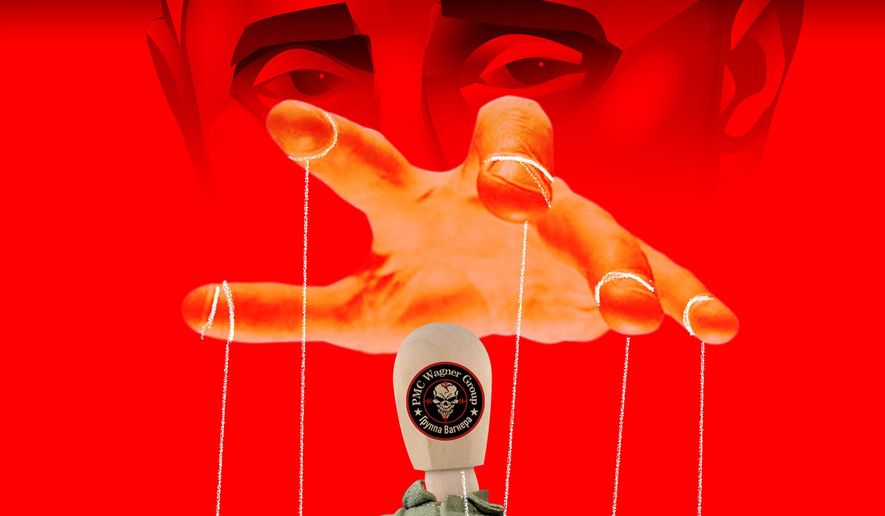OPINION:
The Wagner Group is not, as the name might suggest, a club for lovers of epic German operas. Its members are often called mercenaries, but that’s imprecise. These soldiers of misfortune are not for hire by just any old tyrant or wannabe revolutionary. They fight, kill, and not infrequently get killed in the service of Vladimir Putin and his imperialist ambitions.
The U.S. government last week designated the Wagner Group as a “significant transnational criminal organization,” guilty of mass executions, rapes, child abductions and other atrocities. Sanctions are to be imposed on individuals and companies linked to it.
The group was founded in 2014 to assist Mr. Putin’s conquest of Crimea. Its “little green men” — they wear military clothing without insignia — also began fueling an insurgency in the Donbas region of eastern Ukraine.
Mr. Putin has never acknowledged the group’s ties to his government, but it has recently begun stepping out of the shadows.
“On 27 December 2022, the Russian Unified Register showed that the proxy paramilitary Wagner Group had formally registered as a legal entity,” an unclassified British intelligence update reported. “The group declared their core activity as ‘management consultancy’; no mention was made of combat services.”
Heading Wagner is Yevgeny Prigozhin, whose checkered career includes serving time in prison for robbery, running a hot-dog stand, becoming a high-end restaurateur, and amassing a fortune as a caterer to the Kremlin. This past September, he stopped denying that he was affiliated with the group. A month later, “Putin’s chef,” as he’s been nicknamed, opened elaborate corporate headquarters in St. Petersburg: the PMC Wagner Center.
In theory, PMCs, private military companies, are illegal in Russia. In practice, Russian law conforms to Mr. Putin’s whims. According to Britain’s defense ministry, Mr. Prigozhin “has likely partially funded the organization via inflated government contracts awarded to his other companies.” Such contracts would require Mr. Putin’s approval.
Before Russia’s invasion of Ukraine last February, Wagner was a relatively small force, perhaps 5,000 troops, most of them former soldiers from elite Russian units.
Around 2015, hundreds of Wagner fighters were sent to Syria to shore up the mass-murdering Assad dictatorship. They trained the Syrian Tiger Forces and Liwa al-Quds, a Palestinian militia.
They began operating in Africa in 2017. They are currently in as many as 18 countries on that continent. They’ve been accused of suppressing protesters in Sudan, raping and trafficking women and children in the Central African Republic, and killing three Russian journalists who attempted to report on its exploitation of “blood diamonds.” French forces have withdrawn from Mali with Wagner fighters replacing them.
In February 2018, more than 500 troops — identified by radio intercepts as Russian — launched an assault on an outpost in eastern Syria where U.S. soldiers were assisting Kurdish and Arab forces fighting the Islamic State.
A call was made to the Russian high command in Syria asking that the attack be terminated. The high command denied that Russian troops were in the area.
Green Berets and Marines manned machine guns. U.S. warplanes and helicopters flew in from Al Udeid Air Base in Qatar. According to documents obtained by The New York Times, as many as 300 attackers were killed. Others fled. No Americans were killed. The Kremlin issued no complaints.
In Libya in 2019, Wagner fighters supported rebel general Khalifa Haftar after he attacked the U.N.-backed government in Tripoli.
The group now numbers about 50,000, according to the U.S. National Security Council. Among the new recruits are thousands of felons released from prison in exchange for signing up.
A BBC investigation in 2021 found that Wagner forces make no pretense of abiding by the rules of armed combat. They kill civilians and prisoners of war. “No one wants an extra mouth to feed,” one former Wagnerian told the BBC. Another said that if a captured prisoner has no knowledge to pass on, or cannot work as a “slave,” then “the result is obvious.”
Early last year, Wagner troops were reportedly sent to Kyiv with orders to assassinate Ukrainian President Volodymyr Zelenskyy. They obviously failed.
In March, they were reportedly responsible for the massacre of hundreds of civilians in the Ukrainian town of Bucha. They are now estimated to constitute about 20% of Russia’s forces in Ukraine.
What more could be done about Wagner? It could be designated a foreign terrorist organization. “Wagner’s activity fits the statutory understanding of terrorism: the consistent and intentional use of violence to intimidate and endanger civilians in service of strategic goals,” wrote Capt. Sara Downing, a visiting military analyst at the Foundation for Defense of Democracies’ Center for Military and Political Power, and Madison Urban, an analyst at Valens Global, in a report this past September.
In December, Sens, Roger Wicker, Mississippi Republican, and Ben Cardin, Maryland Democrat, introduced the Holding Accountable Russian Mercenaries (HARM) Act to achieve that goal. A bipartisan House version was introduced last week.
I haven’t yet told you how the group got its name. Bellingcat, a Netherlands-based investigative journalism collective, reports that it traces back to the group’s military field commander, Lt. Col. Dmitry Utkin, “who – thanks to his obsessive fascination with the history of third Reich – had received the nom-de-guerre ‘Wagner’,” a reference to Richard Wagner, Hitler’s favorite composer.
Capt. Downing and Ms. Urban report that the Wagner Group appears to have ties to the Russian Imperial Movement, a white nationalist group based in St. Petersburg.
Coda: Among Richard Wagner’s most important operas is “Gotterdammerung,” which refers to the myth of the destruction of the gods in a final battle. The word has come to imply the cataclysmic downfall of a regime. It would be condign punishment if the regime in question this time around turned out to be Mr. Putin’s.
• Clifford D. May is founder and president of the Foundation for Defense of Democracies (FDD) and a columnist for The Washington Times.




Please read our comment policy before commenting.